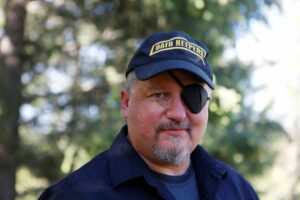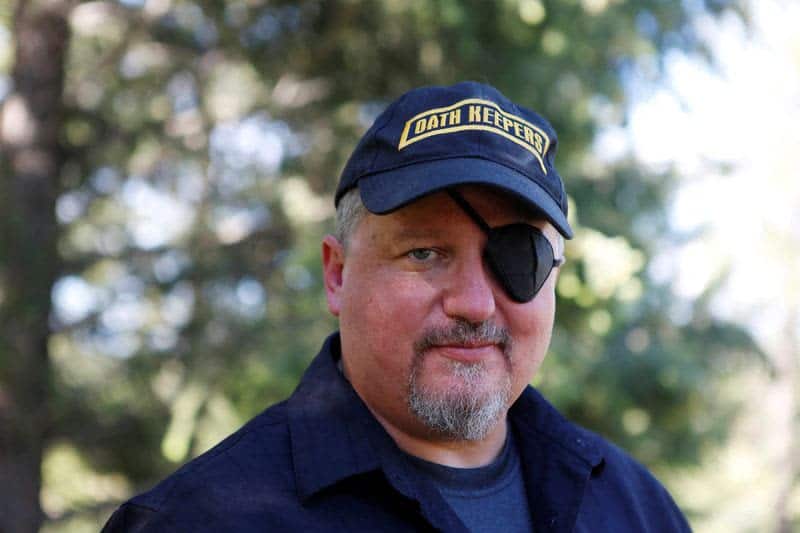
Reuters

By Sarah N. Lynch and Chris Gallagher
WASHINGTON (Reuters) -Prosecutors urged members of a jury to convict Oath Keepers founder Stewart Rhodes and four others for their roles in storming the U.S. Capitol on Jan. 6, 2021, saying they formed an “armed rebellion” to disrupt the peaceful transfer of power.
“They concocted a plan for an armed rebellion to shatter a bedrock of American democracy,” prosecutor Jeff Nestler said in an opening statement at their trial.
Rhodes told his followers during the planning stage that “it will be torches and pitchforks time if they (Congress) don’t do the right thing,” according to a text message shown to the jury by prosecutors.
Rhodes and his co-defendants Kelly Meggs, Thomas Caldwell, Jessica Watkins and Kenneth Harrelson are accused of plotting to forcefully prevent Congress from certifying Democratic President Joe Biden’s 2020 election victory in a failed bid to keep then-President Donald Trump, a Republican, in power.
Trump supporters stormed the U.S. Capitol after Trump falsely claimed the election had been stolen from him through widespread fraud. Five people died during and shortly after the riot, and about 140 police were injured.
The five on trial face numerous felony charges, including seditious conspiracy – a Civil War-era statute that is rarely prosecuted and carries a statutory maximum sentence of 20 years in prison.
Prosecutors have said the five defendants trained and planned for Jan. 6 and stockpiled weapons at a northern Virginia hotel outside the capital for a so-called “quick reaction force” that would be ready if called upon to transport arms into Washington.
As lawmakers met on Jan. 6 to certify Biden’s election victory, some Oath Keepers charged into the Capitol building, clad in paramilitary gear. They are not accused of carrying firearms onto Capitol grounds.
“On that day, as required, Congress met inside the Capitol building … These defendants seized upon that opportunity to disrupt Congress from meeting inside the Capitol building. That was their goal: to stop by whatever means necessary to stop the transfer of power including by taking up arms,” Nestler told a jury of 12 members and four alternates.
‘WILLING TO DIE?’
Watkins told members of her local Ohio chapter that “I need you fighting fit by (inauguration),” while Meggs told followers from the Florida Oath Keepers that “the time for talk is over. The real question is who’s willing to DIE?” according to text messages shown by the prosecution.
On the day of the assault, Nestler said Watkins led a group of seven Oath Keepers toward the Senate side of the Capitol.
As she stormed down the hallway with the “power of the mob with her,” Nestler said she yelled “Push, push, push!”
He said that Watkins added: “They can’t hold us.”
Meggs and Harrelson, meanwhile, led a group of seven Oath Keepers toward the House of Representatives side of the Capitol where Nestler said they looked specifically for House Speaker Nancy Pelosi, the top Democrat in Congress.
Nestler said that on Election Day, Meggs had told his wife Connie, who is criminally charged in a separate case, “I’m gonna go on a killing spree. Pelosi first.”
The government has characterized the Oath Keepers as a far-right anti-government group, some of whose members have ties to militias. Some of the members include current and former military and law enforcement personnel.
Rhodes, a Yale-educated attorney and former U.S. Army paratrooper, has disputed that government’s characterization, saying it’s a non-partisan group whose members have pledged to defend the U.S. Constitution.
Although Trump’s shadow will loom large over the trial, he is not expected to be a central figure in the case.
U.S. District Judge Amit Mehta, who is presiding over the trial, previously restricted the defendants from using a “public authority” defense, meaning they cannot claim they stormed the Capitol at Trump’s direction.
However, attorneys for some of the defendants are expected to argue that their clients believed they could be called to action if Trump invoked the Insurrection Act, a law that empowers the president to deploy troops to suppress civil disorder.
(Reporting by Sarah N. Lynch and Chris Gallagher, editing by Ross Colvin and Grant McCool)


Recommended Comments
There are no comments to display.